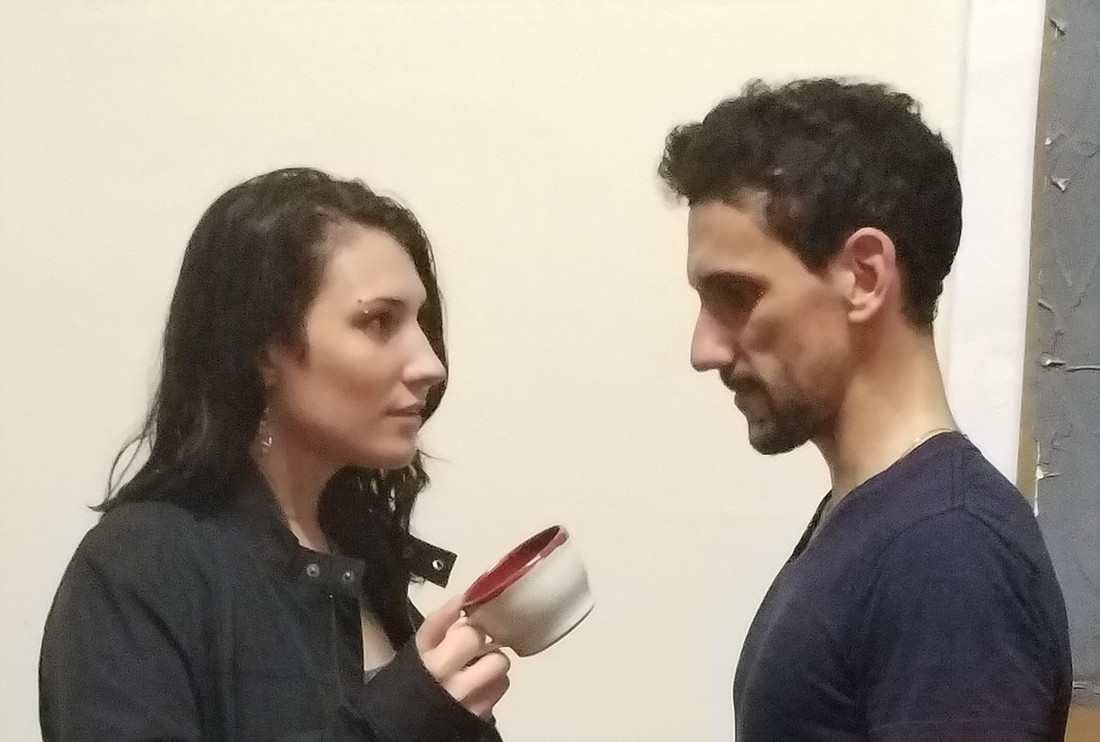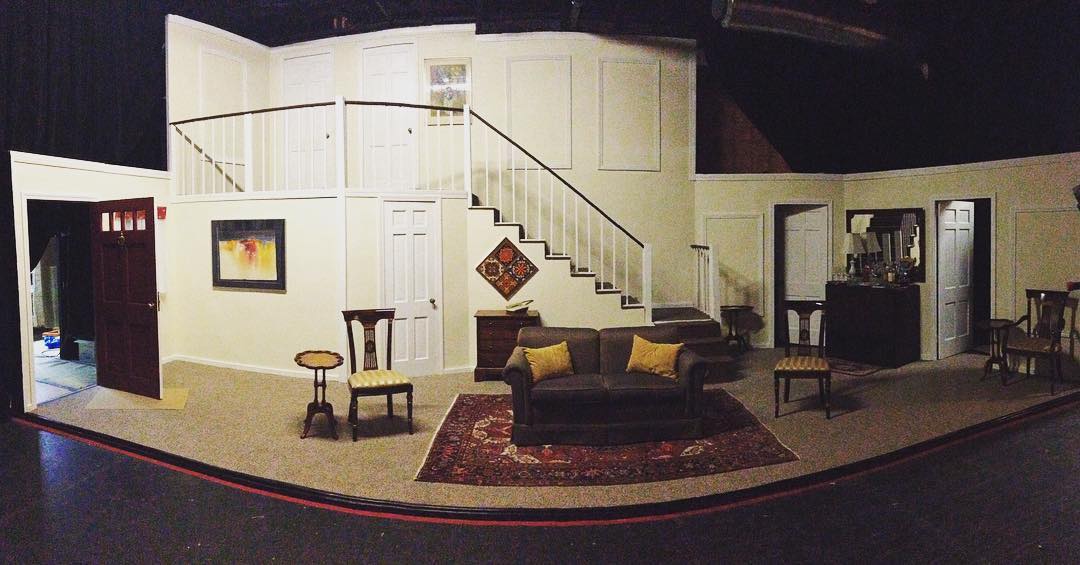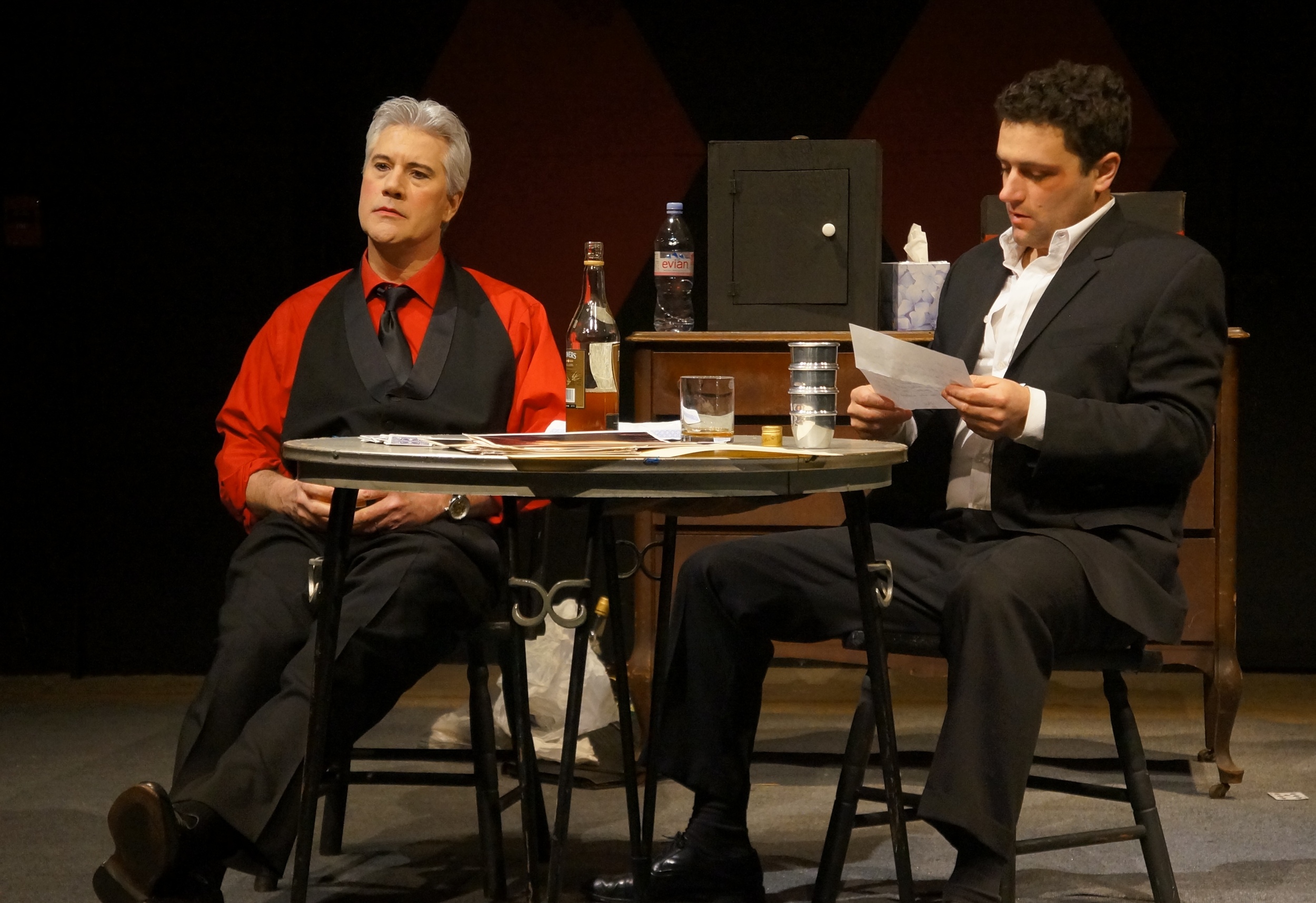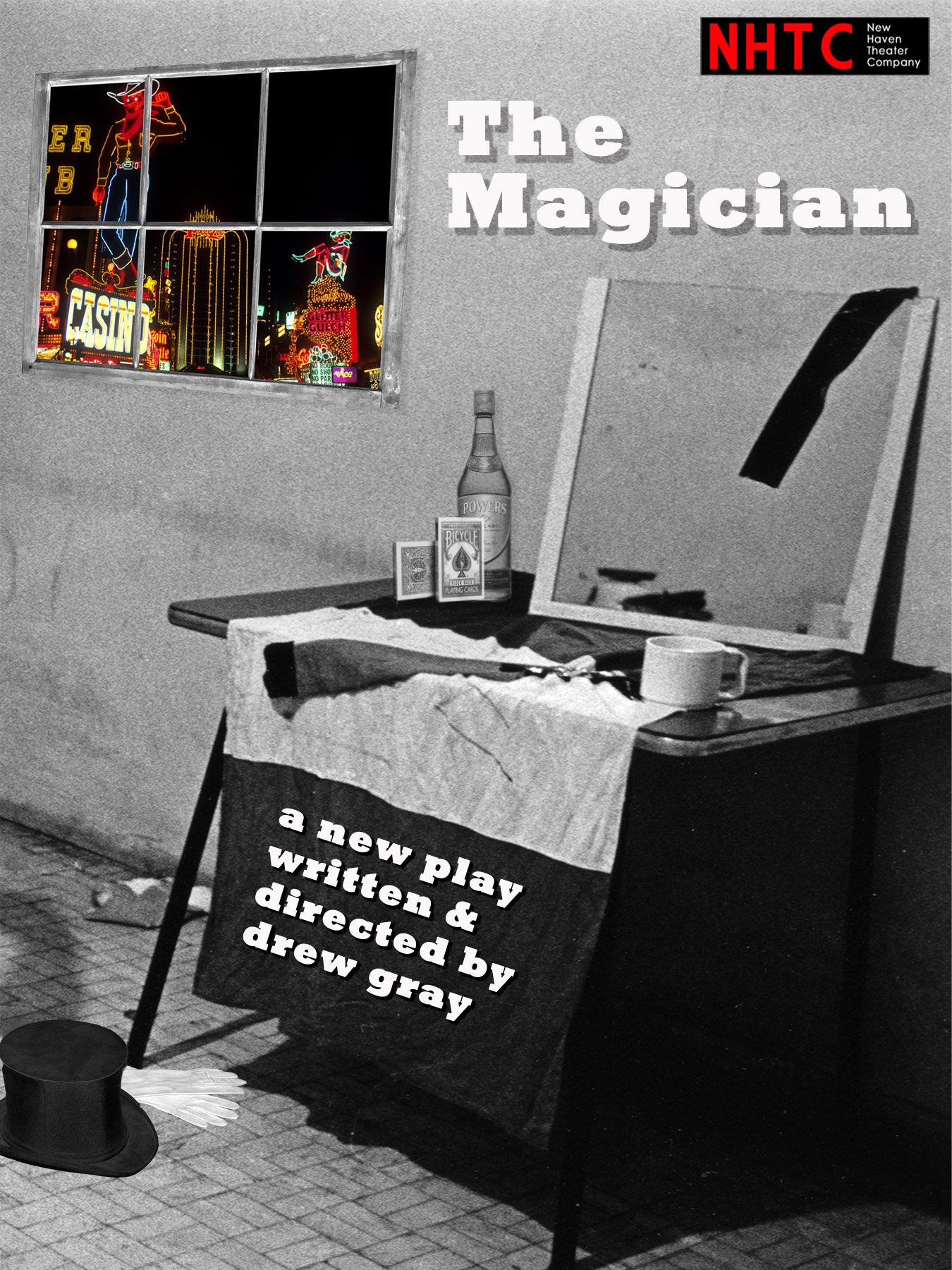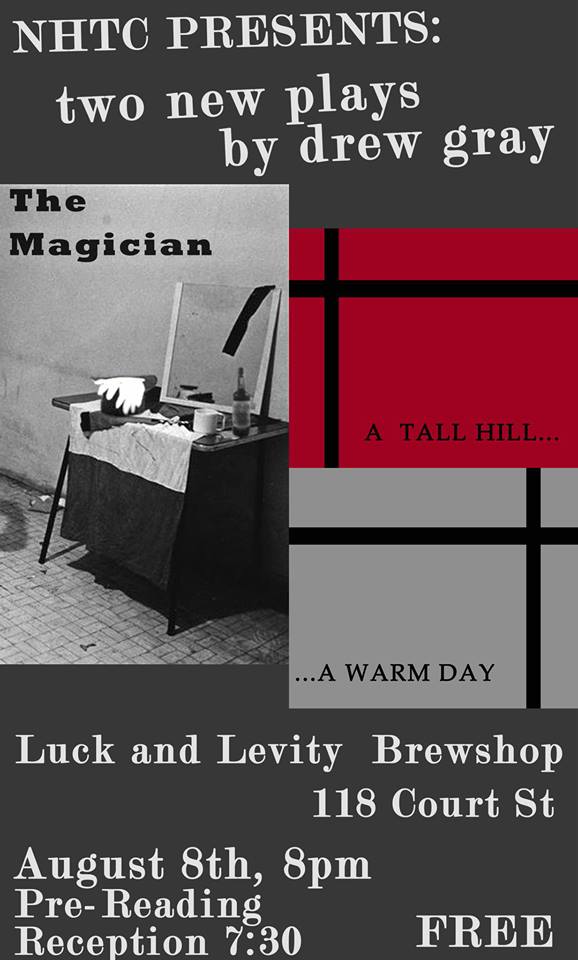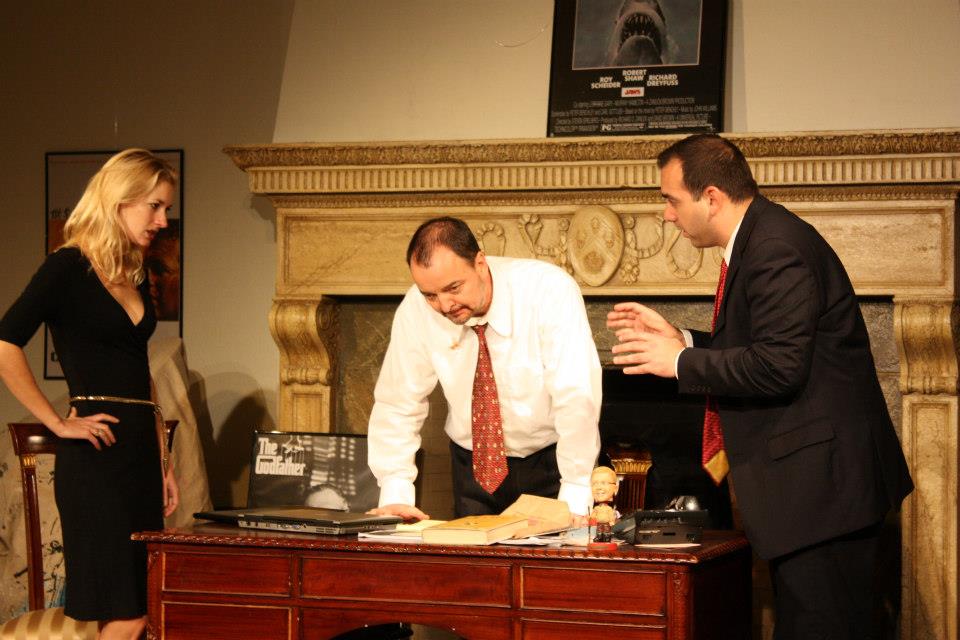Review of The Zoo Story, New Haven Theater Company
How do you feel when approached by a stranger? No doubt there may be a wide variety of answers to that question, depending on who you are, where you are, and the appearance and demeanor of the stranger. Edward Albee’s The Zoo Story explores several possibilities—including uncomfortable, companionable, amused, bemused, and contentious—and drives toward a surprising conclusion.
The play’s original text dates from 1958 but was updated in 2004 and consists wholly of the encounter between Peter (J. Kevin Smith), a comfortably off middle-aged gent who works in publishing and who is seated on a public park bench in New York city, reading a textbook his company published, and Jerry (Trevor Williams), a self-professed “permanent transient” who wanders up and gets Peter’s attention, in a somewhat peremptory manner. Jerry’s appearance in the New Haven Theater Production, co-directed by Steve Scarpa and George Kulp, with his long mane of blonde hair pulled back and very casual clothing, might give some pause; then again, his early mention of some little-known fact about Freud shows the kind of verbal assurance that tends to put others at ease. He seems friendly, interested in Peter, and no more invasive than any random person you might chat with on a bus or in a bar or, indeed, on a park bench.
Jerry (Trevor Willilams), Peter (J. Kevin Smith) in The Zoo Story, New Haven Theater Company
The play is a finely tuned little machine centered on the nuances of a give-and-take where any number of social codes may be in play, where any statement becomes the material of the exchange. Jerry initially announces he has been to the zoo; he says he’s been walking north—or northerly; he says, more than once, that sometimes he “has to go a very long distance out of his way to come back a short distance correctly.” The early emphasis on Peter—his job, his marriage, his two daughters with their two cats and two parakeets, and the fact that no more children will be forthcoming—swiftly is elided to concentrate on Jerry, who shares information about his parents and his sex life and the rooming-house where he resides, way up on the upper-upper West side.
The running time of The Zoo Story, called “a play in one scene,” is about an hour, and yet it can be seen as a very compressed three act. The first act is the set-up of us getting to know a bit about Peter and understanding that he, like us, is becoming interested in Jerry, largely because of how he expresses himself. The second act is Jerry’s detailed account of his relationship to a dog owned by his landlady, a dog that regularly threatens him each time he returns to the house. The third act, with Jerry finally sharing the bench with Peter, would seem to be concerned with what happened at the zoo, a story that Jerry seemed poised to tell all along. But then doesn’t. Instead, there’s the question of the bench.
As Peter, J. Kevin Smith displays a certain patient tolerance, the feeling that most liberal city-dwellers pride themselves on perhaps. He also stays in the game by reacting to Jerry’s lengthy speeches. Jerry is emphatically not someone talking to himself. He’s speaking to Peter and Peter’s attention is of paramount importance. He’s a stand-in for the theater-goer, certainly, but he’s also a character in his own right, with his own grasp of how what Jerry says affects him. And when he finally gets riled, the play might for a moment morph into something in Neil Simon territory—The Prisoner of Second Avenue, for instance. It then takes a decisive turn away from simply needling the comic upset of a prosperous New Yorker.
Jerry (Trevor Williams), Peter (J. Kevin Smith) in The Zoo Story, New Haven Theater Company
What keeps the play in a different register throughout is Jerry. In Trevor Williams’ bravura turn, he’s a very engaging fellow, the kind of person who takes pleasure in thinking aloud and does so in an appealing way. And yet Williams, in subtle glances off or thoughtful pauses, gives us the idea that Jerry has something in mind, a point or argument that he’s building, and when he gets confrontational we’re not entirely sure it’s not a joke—or was this a territorial grab all along?
The stories Jerry tells and the persons who people them let Peter have a glimpse of a level of existence he would likely never encounter directly. That, we might think, is Albee’s point: to make a self-satisfied bourgeois meet—fleetingly but in such a way as to change their lives forever—a member of an underclass who possesses the interpersonal aplomb of a born raconteur, and maybe a steely—malevolence? Determination?
But there’s more, lots more.
The play is almost parable-like, an effect helped by the way the NHTC production, in Kulp’s set with Adam Lobelson’s lighting, surrounds the simple bench and walkway with hanging curtains and thrust seating. The everyday and the theatrical are in immediate relation. And what ultimately transpires there has a lot to do with such matters as what separates humans from animals, what constitutes connection between creatures, and what is the value and benefit of what Jerry calls “the teaching moment.” In the end, he seems sincerely grateful for what Peter has done for him. And we should also be grateful for what Jerry has given us.
The Zoo Story, as one of the simplest of stories, is also one of the deepest New Haven Theater Company has enacted. This collaboration between longtime members Kulp, Scarpa and Smith with “newer” member Williams (this is only his tenth production!) showcases the troupe’s grasp of how dialogue and interaction are what matter most in great drama. Albee’s text gives the actors playing Jerry and Peter a lot of leeway in how to make the play work—whether more naturalistic, more absurdist, and with differing degrees of subtext. What makes NHTC’s production work so well is the way Williams and Smith are both willing to play what might be some version of themselves, and then to take that where it has to go. Inevitable, but surprising. And even if you know the outcome, seeing the play get there—to watch it go a long way to come back a short distance—is the fascination of “the zoo story.”
The Zoo Story
By Edward Albee
Co-directed by George Kulp & Steve Scarpa
Stage Manager & Board: Stacy Lupo; Set Design: George Kulp; Lighting Design: Adam Lobelson; Sound Design: Tom Curley
Cast: J. Kevin Smith, Trevor Williams
New Haven Theater Company
February 20-22, February 27-29, March 5-7, 2020















